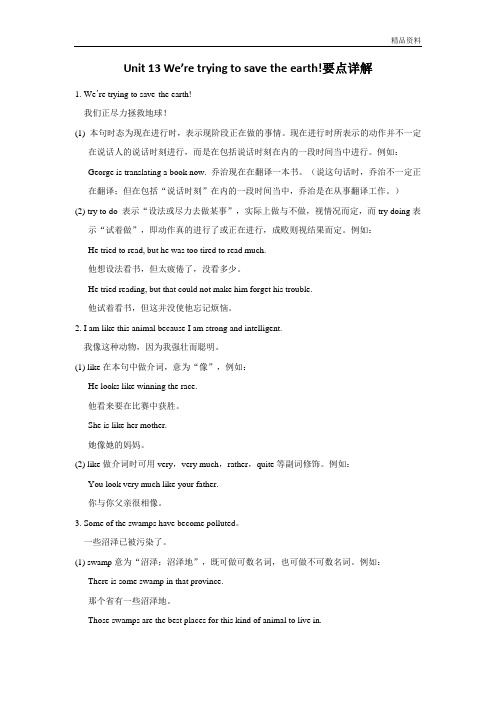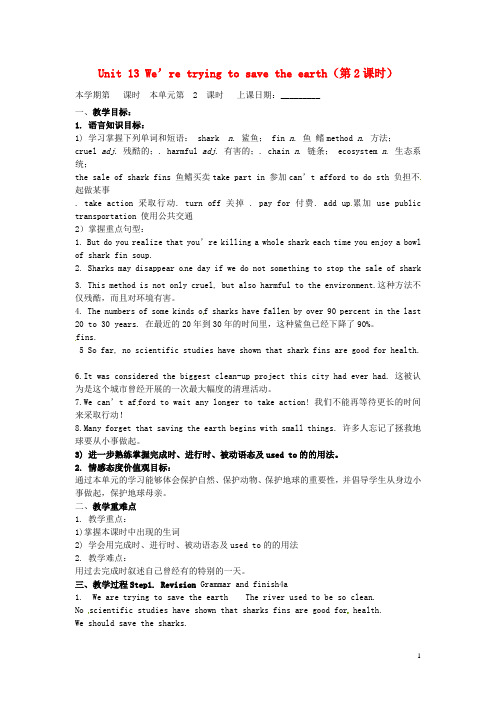年人教版山东省邹平县实验中学九年级英语 Unit 13 We’re trying to save the earth Section B课件.ppt
- 格式:ppt
- 大小:3.91 MB
- 文档页数:46

Unit 13 We’re trying to save the earth!要点详解1. We’re trying to save the earth!我们正尽力拯救地球!(1) 本句时态为现在进行时,表示现阶段正在做的事情。
现在进行时所表示的动作并不一定在说话人的说话时刻进行,而是在包括说话时刻在内的一段时间当中进行。
例如:George is translating a book now. 乔治现在在翻译一本书。
(说这句话时,乔治不一定正在翻译;但在包括“说话时刻”在内的一段时间当中,乔治是在从事翻译工作。
)(2) try to do 表示“设法或尽力去做某事”,实际上做与不做,视情况而定,而try doing表示“试着做”,即动作真的进行了或正在进行,成败则视结果而定。
例如:He tried to read, but he was too tired to read much.他想设法看书,但太疲倦了,没看多少。
He tried reading, but that could not make him forget his trouble.他试着看书,但这并没使他忘记烦恼。
2. I am like this animal because I am strong and intelligent.我像这种动物,因为我强壮而聪明。
(1) like在本句中做介词,意为“像”,例如:He looks like winning the race.他看来要在比赛中获胜。
She is like her mother.她像她的妈妈。
(2) like做介词时可用very,very much,rather,quite等副词修饰。
例如:You look very much like your father.你与你父亲很相像。
3. Some of the swamps have become polluted。
一些沼泽已被污染了。

人教版英语九年级全册Unit 13We're trying to save the earth! SectionB (2a-2e)教案人教版九年级全册Unit 13 We're trying to save the earth! Section B (2a-2e)教案I. Objectives:By the end of this lesson, students will be able to:Discuss environmental issues and solutions in English.Provide suggestions for saving the earth.Understand the use of passive voice in the context of environmental problems.II. Materials:Student textbook: Unit 13 “We’re trying to save the earth!” Section B. Whiteboard or blackboard and markers/chalk.Pictures or videos related to environmental problems.III. Procedure:Warm-up:Begin the class by showing pictures or videos related to environmental problems such as air pollution, deforestation, or plastic waste.Ask students to name the environmental problems they see and discusstheir causes and potential solutions as a class.Presentation:Introduce the topic of the lesson: environmental problems and solutions. Review the vocabulary related to the environment and add any necessary new vocabulary on the board.Discuss the use of passive voice in talking about environmental issues. Practice: (15 minutes)a. Activity 1: Vocabulary ReviewHave students work in pairs or small groups to match the vocabulary words with their definitions or examples. Use flashcards or a worksheet for this activity.b. Activity 2: Group DiscussionDivide the class into groups of four or five.Provide each group with a list of environmental problems (air pollution, water pollution, deforestation, etc.).Ask each group to discuss the causes and effects of the assigned problem and brainstorm possible solutions.Encourage students to use the passive voice when discussing the problems and solutions.Production:Hand out Worksheet 2a from the textbook to each student.Instruct students to complete the sentences using the correct passiveforms of the verbs in brackets.Allow students to work individually or in pairs to complete the task. Review the answers as a class and provide feedback.Consolidation:Conduct a class discussion and ask students to share their suggestions on how they can contribute to saving the earth.Encourage students to provide specific actions they can take individually or as a group.Summarize the key points discussed in the class and emphasize the importance of everyone’s efforts in saving the earth.Wrap-up:Assign Homework: Ask students to write a short paragraph about one environmental problem they are most concerned about and one solution they suggest.Recap the main points of the lesson and remind students to complete their homework.Assessment:Assess students based on their participation in group discussions, completion of the worksheet, and the quality of their homework assignment.Role Play:Divide the class into pairs or small groups.Assign each group a scenario related to an environmental problem (e.g., a discussion between a factory owner and an environmentalist, or a debate between two friends about the use of single-use plastics). Instruct students to prepare and perform a role play based on their assigned scenario.Encourage students to use the passive voice and express different perspectives on the issue.Research Project:Assign each student or group a specific environmental problem to research.Instruct students to gather information, statistics, and examples related to the problem.Ask students to create a presentation or poster to share their findings with the class.Provide time for students to present their research and discuss possible solutions.Writing Task:Ask students to write a persuasive letter to a local government official, addressing an environmental problem in their community.Instruct students to explain the issue, its impact, and propose specific actions or policies that can help solve the problem.Encourage students to use persuasive language and provide evidence tosupport their arguments.Homework:Review the vocabulary words related to the environment.Research and write a short essay on one global environmental issue, its causes, and its potential impact on the world. Includesuggestions for how individuals and governments can address the issue.。

Unit 13 We are trying to save the earth.1.重点词汇:bottom, fisherman, coal, advantage, industry, law, gate, bottle, president, work, metal...2. 短语归纳:1. be full of 充满2. get in the shower 在洗淋浴3. leave sth in sp 把某物留在某地4. by the time... 到……的时候;到……之前5. be late for class 上课迟到6. go off 发出响声7. brush one’s teeth 刷牙8. give sb a lift 捎某人一程9. be about to 即将……;正要……10. stare at 盯着看11. in disbelief 疑惑地;不相信地12. take off (飞机等)起飞13. show up 赶到14. get a chance to do sth 得到一个做某事的机会15. leave for sth 动身去某地16. sell out 卖光17. lose weight 减肥18. run out of 用完3. 必背典句:1. We are trying to save the earth. 我们正在努力拯救地球。
2. The river used to be clean. 这条河过去是干净的。
3. The air is badly polluted. 空气受到严重污染。
4. No scientific studies have shown that shark fins are good for health.没有科学研究表明鱼翅对健康有益。
4.语法知识:英语句子成分分析组成句子的各个部分叫做句子成分。
它包括:主语、谓语、宾语、定语、状语、表语和宾语补足语等。



Unit 13 We’re trying to save the earth(第2课时)本学期第课时本单元第 2 课时上课日期:_________一、教学目标:1. 语言知识目标:1) 学习掌握下列单词和短语: shark n. 鲨鱼; fin n. 鱼鳍method n. 方法;cruel adj. 残酷的;. harmful adj. 有害的;. chain n. 链条; ecosystem n. 生态系统;the sale of shark fins 鱼鳍买卖take part in 参加can’t afford to do sth 负担不起做某事. take action 采取行动. turn off 关掉 . pay for付费. add up累加 use public transportation 使用公共交通2)掌握重点句型:1. But do you realize that you’re killing a whole shark each time you enjoy a bowl of shark fin soup.2. Sharks may disappear o ne day if we do not something to stop the sale of shark3. This method is not only cruel, but also harmful to the environment.这种方法不仅残酷,而且对环境有害。
4. The numbers of some kinds o f sharks have fallen by over 90 percent in the last 20 to 30 years. 在最近的20年到30年的时间里,这种鲨鱼已经下降了90%。
fins.5 So far, no scientific studies have shown that shark fins are good for health.6.It was considered the biggest clean-up project this city had ever had. 这被认为是这个城市曾经开展的一次最大幅度的清理活动。